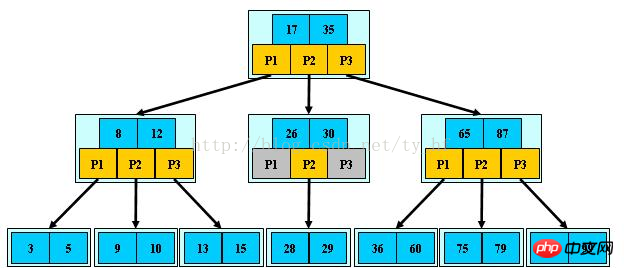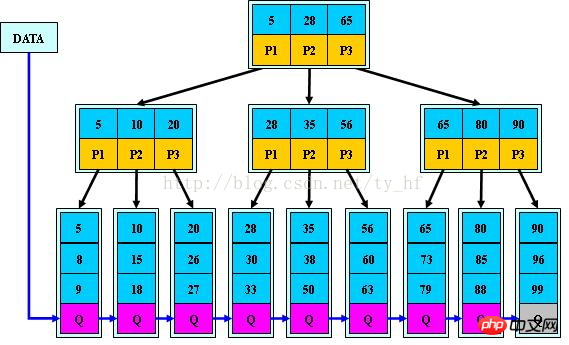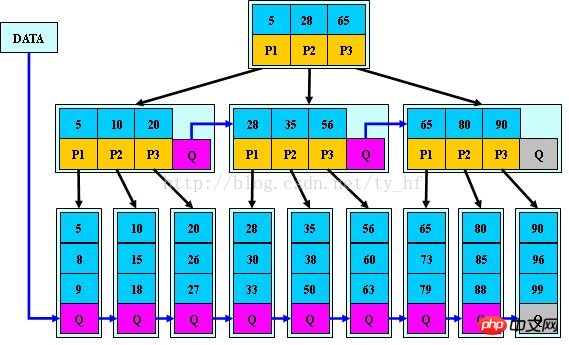Mysql-index-BTree type [simplified]
I have read a lot of summaries about B-TREE on the Internet, b-tree, B-tree, B+ tree, B* tree (why does Emma still have 4? She is almost confused),
Some of them are really exciting and admirable, but they are all too long. A long paragraph of text is daunting. Let’s just make a simplified version of the summary, introduce it in a simple and mobile way, and talk about their differences.
1. B-tree
##Binary Tree is a binary tree. (The formulas for K, h, and n will not be discussed here. If you are interested, you can search it yourself..)
(1) All non-leaf nodesHave at most two sons(Left and Right);
(2)All node storageA keyword;
(3) The left pointer of a non-leaf node points to less than its key The subtree of a word, the right pointer points to the subtree larger than its keyword; (Simply put, the left side of is smaller than itself, and the right side is larger than itself)
## FigureB tree
#
#二.B-TreeBalance Binary Tree --AVL tree [The B here actually means balance~]
(1) The depth of the left subtree and right subtree of the root node differs at most by 1.(This ensures that it will not occur The extreme phenomenon on the right side of the picture above)
(2) The left subtree and right subtree of the root node are both a balanced binary tree .
(3) All nodes have storage Keywords;
No matter what the inserted sequence is, we can build a balanced binary tree through adjustments to ensure that the balance factor of each node in the binary tree will not be greater than 1, Ensures that the depth of the tree reaches the shallowest, so the number of comparisons will be fewer and the time complexity will be reduced
Figure B-Tree
#三.B+tree
The search of B+ is basically the same as that of B-tree. The difference is that B+ tree only hits the leaf node (B-tree can hit non-leaf nodes)(1) All keywords appear in the linked list of leaf nodes (dense index), and the keywords in the linked list happen to be ordered; ( Only the root node stores the keyword and the end of the tree has a value )
(2) Non-leaf nodes are equivalent to leaf nodes Index (sparse index), leaf nodes are equivalent to the data layer that stores (keyword) data. (Non-root node actually stores the index pointing to the root node)
(3 ) Because of the first two points, it is impossible to store data in non-leaf nodes. (The third difference between B-)
(4) The root node also has a chain pointer horizontally (it’s convenient to follow the clues quickly, but there is no such thing) Pointer, even if the next value is an adjacent neighbor, you have to run in a circle to get it)
Note that most of the index results we generally use, or the B-TREE structure we usually refer to, refer to the B+ structure~~Picture B+Tree## Four. B* tree
is the B+
tree Variants,(1)B+The non-root and non-leaf nodes of the tree add pointers to brothers; [Compare to item 4 of B+ above, in the non-root The node also adds a horizontal linked list]#Figure B * TreeB tree: binary tree,
##5. Summary:Each node Only one keyword is stored. If it is equal, it will hit. If it is smaller, it will go to the left node, if it is greater, it will go to the right node; (But the B-tree may lead to different structures after multiple insertions and deletions ), for this reason, a balanced binary tree is generated after adding the balancing algorithm, also known as B-tree
##B-tree: Based on the B-tree, plus the balancing algorithm and multi-path search tree,1. Each node stores M/ 2 to M keywords,2. Non-leaf nodes store child nodes pointing to the keyword range;3. All The keyword appears in the entire tree and only appears once,4. Both leaf nodes and non-leaf nodes can be hit (whether data is stored);
##B+ tree: Based on B-tree,1. Add a linked list pointer to the leaf node;
2. All keywords appear in leaf nodes,
3. Non-leaf nodes are used as indexes of leaf nodes;4. The B+ tree always hits the leaf node;
B* tree : Based on the B+ tree, the linked list pointer is also added to the non-leaf nodes, and the minimum utilization of the node is increased from 1 /2 increased to 2/3;
# Question: B* is more efficient, but why do you think b* trees are used less? ????Or where is it useful? ? Maybe I still see too little. . Children's shoes who know something can learn from each other, please give me some advice, thank you in advance~
Answer: I recently learned that there is a person named Reiser4’s file system seems to use this structure. Its author Hans Reiser, killed his wife because she made him cuckold and was imprisoned, which directly affected the progress of the project. . .
Introduction:Linux File System ReiserFS Author Hans Reiser was sentenced to 15 years in prison for murdering his wife. The development of ReiserFS has not stopped, although it has not yet been merged. Go to the Linux main branch. A small group of developers continues to work on the fourth version of ReiserFS (Reiser4 for short), and they released the new version last month. ##, supports Linux3.5.4 kernel. The above is the content of Mysql-index-BTree type [simplified]. For more related content, please pay attention to the PHP Chinese website (www.php.cn)!
#

Hot AI Tools

Undresser.AI Undress
AI-powered app for creating realistic nude photos

AI Clothes Remover
Online AI tool for removing clothes from photos.

Undress AI Tool
Undress images for free

Clothoff.io
AI clothes remover

Video Face Swap
Swap faces in any video effortlessly with our completely free AI face swap tool!

Hot Article

Hot Tools

Notepad++7.3.1
Easy-to-use and free code editor

SublimeText3 Chinese version
Chinese version, very easy to use

Zend Studio 13.0.1
Powerful PHP integrated development environment

Dreamweaver CS6
Visual web development tools

SublimeText3 Mac version
God-level code editing software (SublimeText3)

Hot Topics
 1658
1658
 14
14
 1415
1415
 52
52
 1309
1309
 25
25
 1257
1257
 29
29
 1231
1231
 24
24
 MySQL's Role: Databases in Web Applications
Apr 17, 2025 am 12:23 AM
MySQL's Role: Databases in Web Applications
Apr 17, 2025 am 12:23 AM
The main role of MySQL in web applications is to store and manage data. 1.MySQL efficiently processes user information, product catalogs, transaction records and other data. 2. Through SQL query, developers can extract information from the database to generate dynamic content. 3.MySQL works based on the client-server model to ensure acceptable query speed.
 How to start mysql by docker
Apr 15, 2025 pm 12:09 PM
How to start mysql by docker
Apr 15, 2025 pm 12:09 PM
The process of starting MySQL in Docker consists of the following steps: Pull the MySQL image to create and start the container, set the root user password, and map the port verification connection Create the database and the user grants all permissions to the database
 Laravel Introduction Example
Apr 18, 2025 pm 12:45 PM
Laravel Introduction Example
Apr 18, 2025 pm 12:45 PM
Laravel is a PHP framework for easy building of web applications. It provides a range of powerful features including: Installation: Install the Laravel CLI globally with Composer and create applications in the project directory. Routing: Define the relationship between the URL and the handler in routes/web.php. View: Create a view in resources/views to render the application's interface. Database Integration: Provides out-of-the-box integration with databases such as MySQL and uses migration to create and modify tables. Model and Controller: The model represents the database entity and the controller processes HTTP requests.
 Solve database connection problem: a practical case of using minii/db library
Apr 18, 2025 am 07:09 AM
Solve database connection problem: a practical case of using minii/db library
Apr 18, 2025 am 07:09 AM
I encountered a tricky problem when developing a small application: the need to quickly integrate a lightweight database operation library. After trying multiple libraries, I found that they either have too much functionality or are not very compatible. Eventually, I found minii/db, a simplified version based on Yii2 that solved my problem perfectly.
 MySQL and phpMyAdmin: Core Features and Functions
Apr 22, 2025 am 12:12 AM
MySQL and phpMyAdmin: Core Features and Functions
Apr 22, 2025 am 12:12 AM
MySQL and phpMyAdmin are powerful database management tools. 1) MySQL is used to create databases and tables, and to execute DML and SQL queries. 2) phpMyAdmin provides an intuitive interface for database management, table structure management, data operations and user permission management.
 Laravel framework installation method
Apr 18, 2025 pm 12:54 PM
Laravel framework installation method
Apr 18, 2025 pm 12:54 PM
Article summary: This article provides detailed step-by-step instructions to guide readers on how to easily install the Laravel framework. Laravel is a powerful PHP framework that speeds up the development process of web applications. This tutorial covers the installation process from system requirements to configuring databases and setting up routing. By following these steps, readers can quickly and efficiently lay a solid foundation for their Laravel project.
 MySQL vs. Other Programming Languages: A Comparison
Apr 19, 2025 am 12:22 AM
MySQL vs. Other Programming Languages: A Comparison
Apr 19, 2025 am 12:22 AM
Compared with other programming languages, MySQL is mainly used to store and manage data, while other languages such as Python, Java, and C are used for logical processing and application development. MySQL is known for its high performance, scalability and cross-platform support, suitable for data management needs, while other languages have advantages in their respective fields such as data analytics, enterprise applications, and system programming.
 MySQL vs. Other Databases: Comparing the Options
Apr 15, 2025 am 12:08 AM
MySQL vs. Other Databases: Comparing the Options
Apr 15, 2025 am 12:08 AM
MySQL is suitable for web applications and content management systems and is popular for its open source, high performance and ease of use. 1) Compared with PostgreSQL, MySQL performs better in simple queries and high concurrent read operations. 2) Compared with Oracle, MySQL is more popular among small and medium-sized enterprises because of its open source and low cost. 3) Compared with Microsoft SQL Server, MySQL is more suitable for cross-platform applications. 4) Unlike MongoDB, MySQL is more suitable for structured data and transaction processing.








